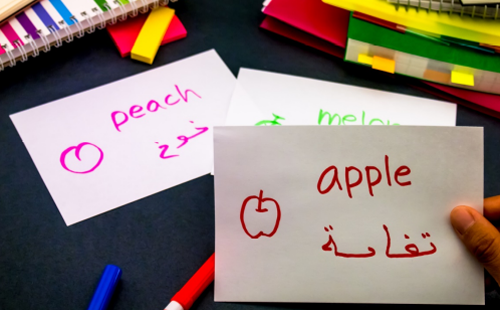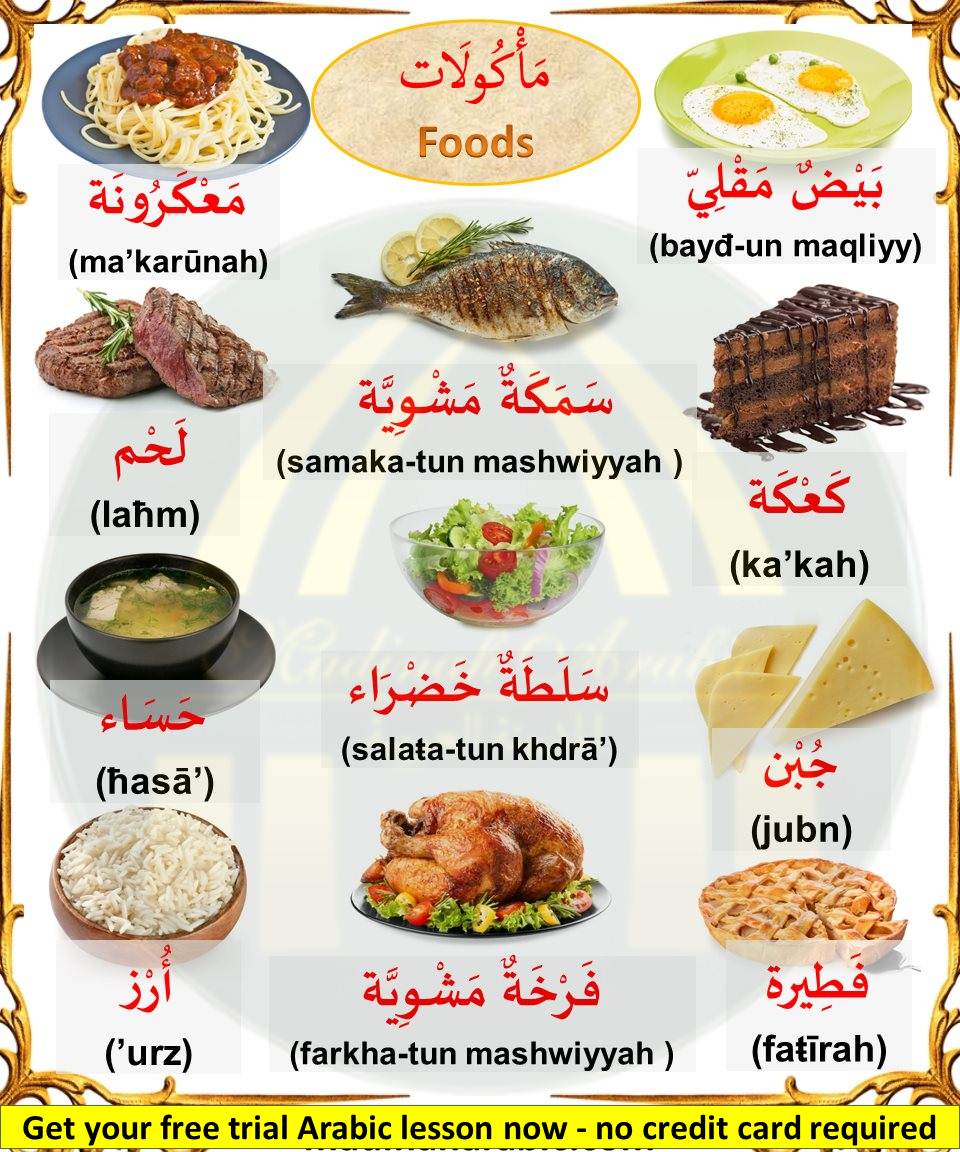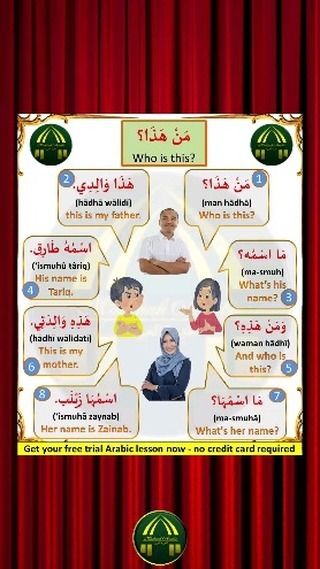How to Memorize Arabic Vocabulary

Increasing vocabulary is one of the best ways to learn Arabic. In this blog, we'll talk about how to memorize Arabic vocabulary effectively. The more Arabic vocabulary you memorize, the better Arabic language you have. Check out our list of tips for learning Arabic vocabulary below.
Learn Basic Arabic Words and Phrases
If you are just starting out with learning the language, it can be helpful to learn some basic words and phrases. Here are some of the most common words and phrases you should know:
Hello: marhaba مَرْحَبًا
How are you?: kayf ħaluk? كَيْفَ حَالُك؟
Thank you: shukran شُكْرًا
Yes: naʿam نَعَم
No: lā لا
Please: min fađlik مِنْ فَضْلِك
Excuse me: ma`dhiratan مَعْذرَةً
Goodbye: maʿa ssalāmah مَعَ السَّلامَة
These are just a few of the many words and phrases you can learn in Arabic.
Here are some more to expand your Arabic vocabulary:
I am happy. anā saʿīd أنَا سَعِيد
Are you hungry? hal `anta ǰa`iʿ أنَا جَائِع
Look! `unđhur انْظُر
Why Some May Find it Hard
Are you having a problem remembering the Arabic words that you study every day?
Have you tried reviewing them multiple times, only to find out that you forgot the previous ones?
When starting to learn any language, especially a vast one like Arabic, we can easily find ourselves overwhelmed by the great number of words in Arabic. It is even more difficult for foreign learners, who do not live in an Arab country, and do not use Arabic every day. Thus, it is common to wonder how to learn as many words as possible, in a short amount of time.
Strategies for Memorizing More Words in Arabic
Once you have learned some basic Arabic words and phrases, it is important to keep expanding your vocabulary. Here are some strategies on how to learn Arabic vocabulary efficiently:
Learn the Root
Try to learn words that are related by topic. Luckily, Arabic is a root-based language, which means that the words stem from one another. For example, words like male teacher (mudarris مُدَرِّس), female teacher (mudarrisah مُدَرِّسَة) and school (madrasah مَدْرَسَة) all stem from the same root to study (darasa دَرَسَ). This pattern continues in even more words, like lesson (dars دَرْس), studies (dirasāt دِرَاسَات), learner (dāris دَارِس), and so on.
In another example, words like book (kitāb كِتاب), writer (kātib كاتِب), office/desk (maktab مَكْتِب), and library (maktabah مَكْتَبَة) all come from the same root: to write (kataba كَتَبَ).
Accordingly, if you know the root of a group of words, then you can easily guess the meaning of any new word that has the same root.
Understand the Context
Understand context, learn new words in context, rather than memorizing meaningless independent words. This strategy will also help you to learn to use those words in sentences. For example, instead of just memorizing the word book ( كِتاب ), knowing how to use it in a sentence ( i.e. This is the student’s book / هذا كتاب الطالب ) or ( My book is new / كتابي جديد ) will allow you to remember your words in a useful way.
Read a Lot
Reading stories, books, magazines, newspapers, and online articles in Arabic help you a lot to learn Arabic words and increase your Arabic vocabulary quickly.
When you read, your eyes get familiar with Arabic script. When you pronounce with a loud voice the words you read, this is good pronunciation practice. Certainly, you will find many words repeated many times in the text you read. Those words will remain in your mind and you will find most of them repeated in daily life too.
Listen to Podcasts
Listening to podcasts in Arabic could help you learn new words and phrases. You can find a variety of podcasts on different topics online.
Listening is one of the most important language skills. You have to listen to Arabic words from native speakers in order to pronounce them more correctly.
Also, listening helps you memorize new vocabulary easily and effectively. When you listen to podcasts, you will find basic Arabic words repeated many times, so those will remain naturally in your mind.
Watch Movies and TV Shows
One of the most powerful techniques to learn new words and phrases is to watch movies and TV shows in Arabic.
This is more effective than just listening or just reading. When you watch, you practice your ear by listening to Arabic phrases and your eye helps you understand what’s going on.
Yes. You will not understand everything you watch, especially at the beginning, but you have to insist on watching to increase the percentage of what you listen and watch gradually.
Use Flashcards:
Flashcards are a great way to learn many words in Arabic. Each flashcard contains an image expressing the meaning of the new word, the Arabic script related to that word, the audio pronunciation, and it may also contain a translation (mostly in English).
Translation is not recommended when learning and memorizing new vocabulary, as it causes a delay in your speaking skills. This delay is because your brain has to translate from you mother language before speaking.
You can use an app like Quizlet to make your own flashcards.
Word Games
Word games are another great way to learn many new words in Arabic. You can find a variety of word games online or play them either alone or with friends.
You can also try our free online quizzes. They are categorized into beginners, intermediate, and advanced levels and dealing with most fields you need as a learner of Arabic language. Audios of native Arabic pronunciation are also included in those quizzes to insure you get the correct modern standard Arabic pronunciation when playing our quizzes.
It's a great fun way to learn Arabic.
Word of the Day
Setting a daily goal to learn a new word can help you stay motivated and expand your vocabulary and know daily facts about Arabic.
You can learn at your own pace and it's exciting also.
Start with the basic words, and daily used things. You can gradually increase your Arabic learning. You will be surprised how much you learned after a month.
You can find daily posts and short videos on new Arabic words on our social media platforms (Facebook, Twitter, Tiktok, Instagram, and YouTube).
Use Language Exchange Sites
You can use one of the language exchange sites to chat with native Arabic speakers to increase your knowledge in Arabic and increase your vocabulary. Those sites are great for finding native Arabic speakers.
This technique is helpful for developing language proficiency, especially in speaking fluency and listening comprehension.
Once you find the perfect language exchange partner, you can discuss/practice with him/her everything you learn in Arabic. Hence, you can improve your Arabic skills and increase your Arabic vocabulary more easily and quickly
Practice: Learn & Memorize Basic Arabic Words in Common Categories
There is an important tip here. Try to tend as much as you can to learn the most commonly used words in Arabic. Arabic is an old language and it contains a huge vocabulary, so it’s not recommended to waste your effort in not commonly used words.
You can find the most common words in our categorized Arabic vocabulary with images and audios.
Tips for Learning Arabic Vocabulary
Learning the flow of vocabulary of a new language can be challenging, but with the right tips and tricks, you can find the easiest way to learn Arabic vocabulary.
Here are some tips for learning Arabic vocabulary more easily and effectively:
- Have realistic goals (daily or weekly).
- Immerse yourself.
- Practice speaking to use your newly acquired vocabulary.
- Practice listening to ensure you get the correct accent and pronunciation.
- Use online resources.
- Have fun; use language games and apps.
Have Realistic Goals
It’s important to set realistic goals for yourself to increase your Arabic vocabulary. Don't expect to be fluent in a few weeks or months, so you have to gradually increase the number of Arabic words you learn.
Goals should be within the range of your own capabilities to learn and memorize Arabic words and phrases.
Don’t forget to make a plan to review what you have memorized before. This plan is more important than the plan of learning new words and phrases.
Immerse Yourself
Immersing yourself in the language is one of the best ways to learn it quickly and get familiar with the basic Arabic words.
It’s highly recommended to live in an Arabic country or with Arabic people if possible for a long or short period. If it’s not possible, you can alternatively watch movies, read books, and listen to music in Arabic. Thus, you can live in the atmosphere of the Arabic language.
Practice Speaking
It’s easy to know the number of words in Arabic, but it’s very important to practice speaking and using these words in life. Speaking is one of the best ways to learn a language.
Find someone who speaks Arabic (preferably a native Arabic speaker) and practice speaking with him/her regularly.
This way, you can refresh your language skills and get new commonly used words and phrases.
Useful Resources for Learning Arabic
Another way to increase the number of Arabic words you know is to use resources for Arabic learning. There are numerous online resources available for learning Arabic you can use to supplement your learning and practice, as:
- Oxford Arabic Dictionary Online; Arabic to English and English to Arabic, bilingual dictionary designed for both Arabic and English native speakers.
- Almaany Dictionary: An Arabic/Arabic dictionary and also from Arabic to many different languages and vice-versa.
- Al-Jazeera Learning Arabic: A free open educational source.
Here are some videos to help you out.
Books
There are many books available for learning Arabic. The popular ones are:
- Al-Kitaab: Multimedia digital disks and website support, 3 volumes plus the Alif Baa book (for the Arabic alphabet), English explanation.
- The Arabic Language for Dummies: English explanation and transcription, also includes an Arabic-English dictionary, verb tables, and an audio CD with dialogues.
- Teach Yourself Arabic: 3 volumes, English explanation, with Audio CD.
- Arabic Courses (University of Madinah): 3 Volumes, audio CD, Islamic topics.
- Al Arabiyyah Bayna Yadayk: 3 Volumes, audio CD, Islamic topics.
- Gateway to Arabic: English explanation and transcription, 3 Volumes plus Arabic without tears for kids.
Websites
There are many websites dedicated to learning Arabic, such as:
- https://www.madinaharabic.com
- https://www.duolingo.com
- https://arabiconline.eu
- https://learning.aljazeera.net/ar
The most popular complete course is available at https://www.madinaharabic.com
There are many other websites that provide teachers with 1 on 1 lessons or group lessons (but there is no online course available) such as:
YouTube Channels
YouTube channels can help you a lot to learn Arabic and to know many words in Arabic.
Madinah Arabic YouTube channel is one of the oldest and most popular channels with 15.5M views, +100K subscribers, +400 Published videos, numerous playlists, many shorts, and community.
Videos can help you a lot in learning Arabic, as you listen to the pronunciation from native Arabic talent and show how to pronounce. In addition, the visual tools help you understand the real meaning of the phrases you listen to.
Online Courses
There are many online courses available for learning Arabic. Through an online course, you can learn many Arabic phrases and words in Arabic to increase your vocabulary.
Here are some free Arabic courses:
- You can learn how to read from: Free Arabic reading course.
- You can learn words, phrases,and grammar from: Arabic language Course.
This will give you a good start.
If you want to excel, try to check our paid Arabic lessons with one of our male and female qualified native Arabic tutors.
Tutors
Finding a tutor can be a great way to learn Arabic. You can find tutors online through sites like TutorCruncher or in person through language schools.
Our experienced professional native male and female tutors are available 24/7 on Zoom or any other online meeting software. They are well-trained on how to help you understand Arabic and practice speaking, listening, reading and writing skills effectively.
Register for a free trial of 1 to 1 Arabic course and see the magic.
Mnemonics
How many Arabic words are there in Arabic dictionaries? How could people memorize them?
The human brain is able to store huge amounts of data and restore it when needed. Mnemonics are memory aids that can help you remember words or things stored inside your brain.
There are many mnemonic devices you can use to learn new words.
Our brain can’t work easily with foreign language vocabulary if we memories the translation (Red = أَحْمَر), but this process can be done easily if we engage the word with a red-colored ball.
Trivia & Fun Facts about Arabic Language
How Old Is the Arabic Language?
In relation to learning basic Arabic words and vocabulary, let’s have an idea about how old the Arabic language is.
Arabic emerged more than 2,000 years ago. It was slightly different from Modern Standard Arabic in terms of vocabulary and writing. Before its emergence, it was a dialect of the Semitic language.
How Many Arabic Words Are There?
The total number of words in Arabic language according to Al-Faraheedy, the first Arabic lexicographer (died: 170 AH = 786 CE) is over 12,305,412 words. However, a very small percentage of those 12 million words has been actually approved by Arabic lexicographers, i.e. the Arabic dictionaries only have (from 40,000 to 120,000 words).
How Many Words in Arabic Language are Also Used in English?
Apart from the total number of words in Arabic, let’s discuss the influence of Arabic on other languages worldwide. In the first Islamic era, many nations were converted to native Arabic speakers (e.g. from Coptic, Berber, to Arabic, etc.).
Turkish, Persian and Spanish have been influenced by Arabic due to the Islamic domination.
Oxford English Dictionary lists more than 900 Arabic words used in English.
Why Is Arabic a Rich Language?
Arabic might be considered the richest language in words based on its complexity. The Arabic writing system is very smart. It hides many characters that could be easily guessed by most Arabic readers, e.g. short vowels, double consonants, and more.
According to The National – the United Arab Emirates' leading English-speaking news outlet – on average, “a single written word in Arabic has three meanings, seven pronunciations”.
How Many Countries Speak Arabic?
Arabic is the official language in 14 countries and co-official language in 12 countries, while it is a minority language in 7 countries in the world.
Your Takeaway
To sum up, Arabic vocabulary could be acquired in many easy and sure ways, but it requires patience and continued determination.
This can be achieved by listening, watching videos, immersing yourself in an Arabic speaking environment, practicing speaking, finding a good tutor, good partner to share or exchange language with, and the key factor is not to give up your Arabic learning journey.
Try to avoid the arbitrary translation of any word you memorize, rather you can relate the word to an image or a bigger phrase or a sentence.
If you need a magic solution, you can book now for a free trial lesson with one of the tutors of Madinah Arabic who can take care of your Arabic.


